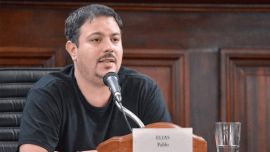More and more observers both at home and abroad are already writing off Argentina as a “failed state” but before concluding that over seven decades of aggressive state intervention have disastrously crashed, it should be asked whether this has ever been seriously tried. Government critics point to public spending having virtually doubled in the past two decades as the root of evil with the solution obviously lying in reversing that trend but it is also worth looking at the quality of that spending. Those looking back to the golden years of a century or so ago when Argentina had one of the 10 highest living standards in the world (but also a life expectancy of 40 according to the 1914 census and appalling housing conditions in a city growing almost twentyfold in half a century) should bear in mind that this model also included a highly active state for better or worse, vigorously expanding public education while imposing military conscription, as well as a classic trade unionism very different from the Peronist variety.
The challenge facing the opposition thus lies not only in explaining how they propose to dismantle a dysfunctional state but how they will replace it – while a basic problem crippling this government is the degree to which it contains its own opposition, the opposition needs to concentrate more on how it is going to be a government if it seeks to be entrusted with that task. Perhaps a simplistic approach will work best electorally but rather more will be required to govern subsequently. While change is imperative, not everything should be assumed to be wrong in the existing order. Even as clearly a disastrous evil as runaway inflation has produced growth almost double the regional average until now with pockets of excellence in the swollen public sector such as in healthcare (even if two years of coronavirus pandemic followed by pay erosion from inflation have dangerously battered morale there).
And while Kirchnerism has generally come up with the wrong answers (even when they have seemed right such as the “soy dollar” adding some US$5 billion to depleted Central Bank reserves but also obliging over 1.5 trillion pesos to be printed to cover the difference between the 200-peso export dollar and the official exchange rate), these have been in response to genuine problems and not merely unforced errors – easy enough to rubbish but the right answers will also be demanded. Those answers will not be found without a deeper appreciation of the problems – it has been said that understanding the problem is half the solution (and the most important half).
A couple of specific examples here from current issues. Critics of the ”Qatar dollar” have quite rightly pointed out that it hits Argentina’s slumping middle class much harder than the rich as against the official line of promoting social justice while protecting the productive sector – it might also be asked if airlines will continue to fly foreign tourists into Argentina if there is no traffic in the opposite direction. Yet this issue of credit card spending abroad simultaneously exposes the glaring income inequalities of Argentine society – just 200,000 of the three million travellers abroad account for 81 percent of that spending. The middle class cannot be defended without serious action to address the income inequalities so much more extreme in Latin America than the rest of the world. That “Qatar dollar“ is, in turn, part of a raft of measures designed to limit reserve outlay to essential imports but how essential are they? Thus the auto industry is indeed a leading exporter but if it required US$6.6 billion of imports for US$5.3 billion of exports in the first two-thirds of this year, the whole model of industrial protectionism and import substitution might be questioned.
The educational crisis is real enough and only aggravated by such populist moves as allowing students to pass without studying and tolerating, when not encouraging, the occupation of school buildings when continuation of education must surely be the bottom line after so many months lost to the pandemic. The opposition response to this tends to seek the reassertion of a lost scholastic and parental authority but this ignores the reasons for that loss of authority with outdated curricula and a rapidly changing technology where the students are often way ahead of their teachers – we can only look ahead not back.
Criticism must be supplemented by constructive alternatives and, to repeat, understanding the problem is the most important half of the solution.


















Comments